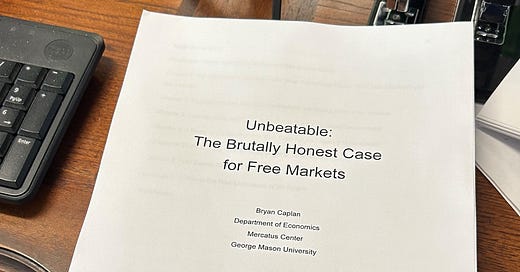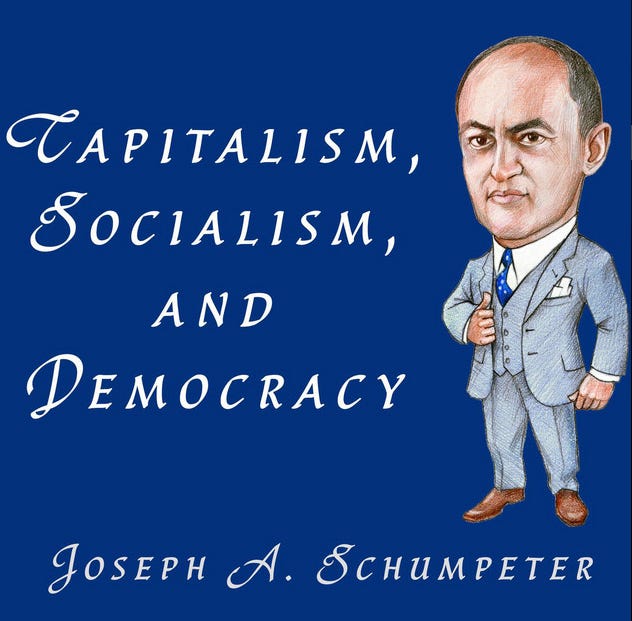
Capitalism, Socialism, and Social Desirability Bias
An excerpt from the Introduction of *Unbeatable*
For the last three and a half years, my main project has been Unbeatable: The Brutally Honest Case for Free Markets. I think of it as my version of Friedman’s Capitalism and Freedom or Free to Choose — an interdisciplinary economist’s deep and broad defense of free markets and attack on government. My central claim is that free-market economics should be rebuilt on the foundation of psychologists’ notion of Social Desirability Bias (SDB). Once you take SDB seriously, you realize that most alleged “market failures” are actually market successes, and most alleged “government successes” are actually government failures.
Now I finally have a good first draft complete. The book still needs months of fact-checking before I’m comfortable sharing it for comments and corrections. But over each of the next eight weeks, I’ll be releasing a weekly excerpt from Unbeatable. This is a key section from the Introduction. Hope you like it!
Capitalism, Socialism, and Social Desirability Bias
You probably sense some ideological issue lurking in the background. Can I really derive any deep lesson about the human condition from truisms about Social Desirability Bias? Strangely, yes.
To repeat, the lessons of Social Desirability Bias are twofold. First: When you spend your own time and money, actions speak louder than words. Second, when you spend other people’s time and money, words speak louder than actions. Now consider: If everyone spends only their own time and their own money, what do we call it? Among other things, “the free market.” What about when people spend other people’s time and money? Among other things, “government.” The ideological issue lurking in the background of SDB is none other than the great ideological issue of the last two centuries. Capitalism versus socialism. Laissez-faire versus the welfare state. Markets versus regulation and state ownership. Neoliberalism versus the Third Way. Libertarianism versus statism.
After two centuries of ideological debate over every variation on “free markets versus government,” believing that we can make much further intellectual progress is damn hard. Haven’t we already heard all there is to say, ad nauseam? Yet in this book I’m going to try to convince you that we can break this logjam by taking Social Desirability Bias seriously. Yes, we’ve been quarreling for two centuries. We’ve practically been deadlocked since the mid-90s, when disillusionment with the post-Soviet transition set in. The cause of the deadlock, I shall maintain, is not that the facts are too muddy, or the arguments too evenly matched. The cause is our all-too-human reluctance to be brutally honest. Many of the leading arguments against markets are, intellectually speaking, arguments in favor of markets. Many of the leading arguments for government are, intellectually speaking, arguments against government. Once we replace SDB with utmost candor, the logjam largely dissolves — and logic rapidly flows in a libertarian direction: pro-market, anti-government.
What exactly does brutal honesty buy us? To start, brutal honesty lets us affirm that the correlation between what is good and what sounds good is quite low. So low, in fact, that we can justifiably praise free markets because they give business incentives to do good stuff that sounds bad and criticize governments because they give politicians incentives to do bad stuff that sounds good. “Good stuff that sounds bad” like: downsizing superfluous workers, hiring tens of millions of low-skilled foreigners, deliberately infecting volunteers with Covid to speed up drug testing, greatly curtailing end-of-life medical care, and leveling historic neighborhoods in San Francisco to build new skyscrapers. “Bad stuff that sounds good” like: free roads, free parking, free college, free health care, licensing medical workers, regulating prescription drugs, requiring building permits, banning recreational drugs, sanctioning employers who hire illegal immigrants, and ensuring a dignified retirement for every American.
Brutal honesty also lets us declare that human beings’ beliefs about free markets versus government are deeply superficial. Even though the correlation between what’s good and what sounds good is low, the correlation between what’s popular and what sounds good is near-perfect. The main reason why most people resent markets is precisely that businesses do good stuff that sounds bad. The main reason why most people smile upon government is precisely that governments do bad stuff that sounds good. And when I say “most people,” that includes the vast bulk of people misclassified as “pro-market” when they’re really only less anti-market than average.
Republicans’ critics, for example, often claim that they favor a world where “anyone who can’t afford health care dies.” Yet in reality, virtually zero Republicans favor such a world. At most, they oppose the expansion of medical programs that already spend over a trillion taxpayer dollars per year. The brutally honest argument against government-funded health care, in contrast, is that the cost of saving a marginal life is too damn high. Spending $100,000 a month to keep an 85-year-old on life support is a terrible use of taxpayer money; a faithful steward of the public interest would pull the plug. Yet flesh-and-blood Republicans don’t merely avoid this brutal truth. They make the opposite argument, accusing the friends of government healthcare of supporting “death panels” to deny taxpayer funding for cost-ineffective coverage.[i]
In 2021, I debated two socialists on National Public Radio.[ii] They repeatedly blamed the world’s problems on “neoliberalism.” I decried this as a strange conspiracy theory. The world contains almost no self-identified neoliberals, much less self-identified ruling neoliberal political parties. Yes, some ruling parties sporadically push for some moderate free-market reforms, but that’s about it. To which New York University sociology professor Vivek Chibber, one of my opponents, responded:
Because it couldn't just say, hey, look. We want to take away all of the social support from the poor and give the money to the rich. You can't actually say that in a democracy. So they say, look. We're trying to cut back on graft, on bloated budgets. We're trying to bring in markets.[iii]
Chibber is partly right: “You can’t say” stuff that sounds bad and expect to get re-elected. But the idea that large numbers of pro-market people secretly yearn to “take away all the social support from the poor and give the money to the rich” is wildly implausible. The far more likely scenario is that even most “pro-market” people are moderate to the core because — like almost all humans — their first allegiance is to Social Desirability Bias. If markets sound bad, if government sounds good, mainstream “pro-market” people support government and oppose markets, just like almost everyone else.
[i] Supporters of such programs predictably deny any plans to use “death panels,” instead of forthrightly saying, “We want to maximize the number of lives our limited resources save, and death panels help us do so.”
[ii] https://www.npr.org/2021/06/21/1008906741/capitalism-what-is-it; transcript https://www.npr.org/transcripts/1008906741.
[iii] https://www.npr.org/transcripts/1008906741












I am looking forward to your efforts while being amazed that you are signing up to be the most unpopular public intellectual of all time. Going against SDB is, perforce, inviting the opprobrium of the vast majority of people who, as per your thesis, succumb to SDB. You are a brave man.
>What exactly does brutal honesty buy us? To start, brutal honesty lets us affirm that the correlation between what is good and what sounds good is quite low. So low, in fact, that we can justifiably praise free markets because they give business incentives to do good stuff that sounds bad and criticize governments because they give politicians incentives to do bad stuff that sounds good. “Good stuff that sounds bad” like: downsizing superfluous workers, hiring tens of millions of low-skilled foreigners, deliberately infecting volunteers with Covid to speed up drug testing, greatly curtailing end-of-life medical care, and leveling historic neighborhoods in San Francisco to build new skyscrapers. “Bad stuff that sounds good” like: free roads, free parking, free college, free health care, licensing medical workers, regulating prescription drugs, requiring building permits, banning recreational drugs, sanctioning employers who hire illegal immigrants, and ensuring a dignified retirement for every American.
I don't think you can take it as a given that that stuff is good or bad. People being free to make their own choices is not always best for them I think as a quick test, you can go "Would I prefer a 5 year old make their own decision on this topic, or would I want their parent to over rule them?" Would you let a 5 year old volunteer to be a covid test subject? Would you tell a five year old they're responsible for checking whether a drug is safe or if the manufacturer is lying about it? Would you tell a five year old they're responsible for their own money and if they waste it all, they're on their own in any emergency?
Many adults are not more responsible than the hypothetical five year old. Having a cautious government step in to make sure fools don't have the freedom to harm themselves can be good.
Directionally, I'd still love to see the world become more libertarian. On most issues, I'd want to take a couple steps to be more libertarian. But already there are some industries that are too permissive, like sports gambling. The whole industry generates relatively little utility, while draining massive amounts of money by preying upon the psychological weaknesses of adults. You wouldn't leave a five year old alone with a bag of Halloween candy and trust them to make the right decision, you shouldn't leave ~20% of US adults alone with a sports gambling app and trust them to make the right decision.